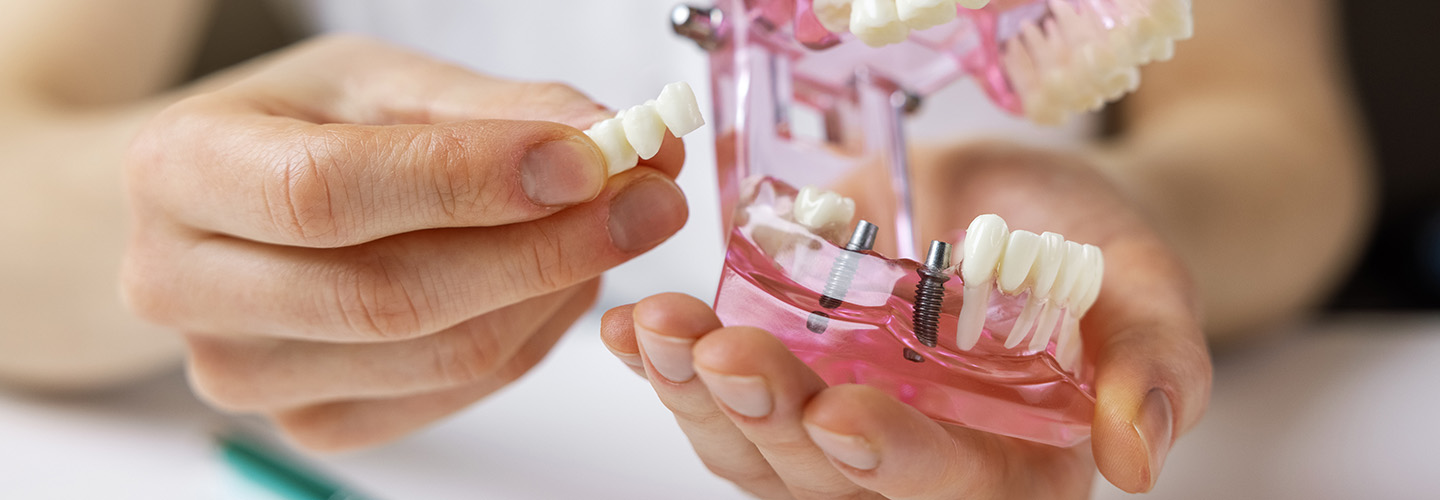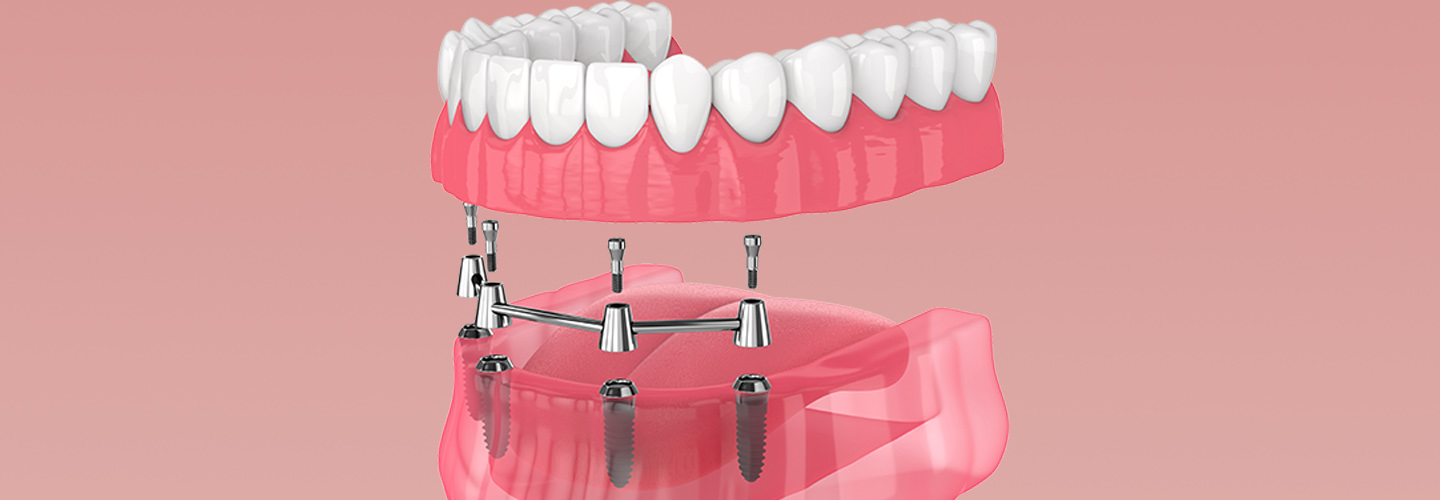Missing Tooth
Services
Restore Your Smile and Improve Oral Health
Your teeth are some of your best assets — helping you communicate, laugh and smile, and eat your favorite foods. Unfortunately, edentulism, or tooth loss, is very common. Losing even one adult tooth can be devastating to your oral health and to your self-confidence. Fortunately, advances in modern dentistry have made restoring these teeth easier than ever.

Dental Implants: Enjoy The Gold Standard in Smile Restoration
At East Ridge Dental, we understand how important your smile is to you. There are many restorations available, but only dental implants can restore and maintain your smile for life. Dental implants are the gold standard in smile restoration, offering a permanent solution to missing teeth.

What are Dental Implants?
Dental implants are artificial tooth roots surgically placed into the jawbone. They provide a permanent foundation for replacement teeth, such as crowns, bridges, or dentures. Implants are made of biocompatible materials, such as titanium, that fuse with the jawbone over time, creating a stable and durable base for replacement teeth. The Different Types of Dental Implants There are different types of dental implants, including:
The Different Types of Dental Implants
There are different types of dental implants, including:

Single Implants
Singular implants replace one missing tooth. A dental crown is attached to the implant, creating a natural-looking replacement tooth.

Implant-Supported Dentures
Implant-supported dentures replace multiple missing teeth or a full arch of teeth. The denture is attached to multiple implants, creating a stable and secure fit.

Implant-Supported Bridges
Implant-supported bridges replace multiple missing teeth adjacent to each other. The bridge is attached to two or more implants, creating a stable and natural-looking replacement for missing teeth.
The Benefits of Dental Implants
Dental implants offer several benefits over other tooth replacement options, such as dentures or bridges. Some of the benefits include:

Improved Appearance
Dental implants look and feel like natural teeth, providing a more natural-looking and aesthetically pleasing smile.

Improved Comfort
Unlike dentures, dental implants are permanently fixed in place and don’t require adhesives. This can improve comfort and make it easier to eat and speak.

Improved Oral Health
Dental implants help maintain the structure of the jawbone and prevent bone loss, which can occur when teeth are missing. They also don’t require the removal of healthy tooth structure, as is necessary with a bridge.

Improved Durability
Dental implants are designed to last a lifetime with proper care and maintenance.
Dental Implants: Frequently Asked Questions
Are dental implants painful?
The dental implant process is typically done under local anesthesia, so you shouldn’t feel any pain during the procedure. Some discomfort and swelling may occur afterward, but these symptoms can be managed with over-the-counter pain medication.
How long do dental implants last?
Dental implants are designed to last a lifetime with proper care and maintenance. Regular dental visits, good oral hygiene, and avoiding bad habits, such as smoking, can help ensure the longevity of your implants.
Are dental implants covered by insurance?
Dental insurance coverage for implants varies by provider and policy. Our team at East Ridge Dental can help you understand your insurance coverage and financing options for dental implants.
Can I get dental implants if I have gum disease?
Patients with gum disease may still be eligible for dental implants, but it will depend on the severity of their condition. Our team will evaluate your oral health and determine the best course of treatment for you. In some cases, treatment for gum disease may be necessary before proceeding with dental implant placement.
Dental Bridges
A dental bridge is a fixed dental restoration used to replace one or more missing teeth. It consists of one or more artificial teeth (pontics) that are anchored in place by dental crowns on the natural teeth or dental implants adjacent to the gap. Dental bridges are designed to “bridge” the gap created by missing teeth, restoring both the appearance and function of the teeth.

Benefits of Dental Bridges:

Fixed, Sturdy Restoration
Unlike removable dentures, dental bridges are fixed in place, so you won’t have to take them out to clean them or worry about them shifting.

Cost-Effective
Dental bridges are an affordable means of restoring your smile.

Lifelike Solution
Dental bridges are custom-made to blend seamlessly with your natural teeth.

Stable
Dental bridges will remain firmly in place, allowing you to eat, speak, and smile normally.

Improved Confidence
When your smile is restored, you’ll likely experience a boost in your appearance, your confidence, and your social interactions.

Longevity and Durability
Dental bridges can last 15 to 30 years with proper oral hygiene and regular dental exams.

Minimally Invasive
Dental bridges are secured to your healthy teeth with dental crowns, requiring no surgery or lengthy healing times.

Prevents Misalignment
Dental bridges help prevent mesial drift, which occurs when your remaining teeth shift towards the space left by your missing teeth.
Dentures and Partials:
Easily & Affordably Restore Your Smile
Missing teeth can harm your self-confidence and overall oral health. But thanks to advances in dental technology, dentures and partials can quickly and affordably restore your smile. At East Ridge Dental, our dentists offer a range of options for dentures and partials to help you regain your smile and your confidence.

What Are Dentures and Partials?
Dentures and partials, and are removable dental prosthetics designed to replace missing teeth. Dentures, also referred to as complete dentures, are typically used when all of the teeth in a patient’s mouth are missing. Partials or partial dentures are used when some natural teeth remain. While dentures remain in place with the help of suction or adhesive, partials stay in place by hooking onto the healthy teeth adjacent to the gap.
Benefits of Dentures and Partials

Improved Appearance
Dentures and partials can fill in gaps and spaces caused by missing teeth, giving you a more natural and youthful appearance.

Better Oral Health
Missing teeth can lead to oral health problems such as gum disease and facial sagging. Dentures and partials can help prevent these issues by protecting empty tooth sockets and maintaining the structure of your face.

Affordability
Dentures and partials are both highly affordable restorative options for patients across tax brackets.

Improved Speech
Missing teeth can affect your ability to speak clearly. Dentures and partials can help you speak more clearly and confidently.

Increased Comfort
Modern dentures and partials are designed to be comfortable and easy to wear, with a more secure fit and fewer adjustments needed.

Easy Maintenance
Caring for your dentures or partials is simple and doesn’t require much extra work.
Dentures and Partials: Frequently Asked Questions
Will dentures or partials affect my ability to eat and speak?
Dentures and partials take a little getting used to, but most patients can eat and speak normally after a brief adjustment period. If you’re experiencing problems that don’t seem to resolve, it may point to a problem with the fit of your full or partial dentures. See your dentist as soon as possible so they can help.
How long will my dentures or partials last?
On average, dentures and partials can last for seven to ten years with proper care and maintenance. Over time, they may need to be adjusted or replaced as your mouth changes due to factors such as loss of jawbone density.
Can I sleep with my dentures or partials in?
We strongly recommend removing your dentures or partials at night to give your mouth a break and allow your gums to rest. Sleeping with your dentures in can deprive your gums of saliva and lead to irritation and infection.
Can dentures and partials be repaired if they are damaged?
Yes, dentures and partials can often be repaired if they are damaged. It’s important to bring them to a dentist as soon as possible if they are broken or damaged in any way, as delaying repairs could lead to further damage and a more costly repair in the future.
Implant-Supported Dentures:
The Modern Solution for a Confident Smile
Dental issues can make life difficult, especially when it comes to eating and speaking. Traditional dentures have been a popular solution for missing teeth, but they come with their own set of problems. Denture wearers often complain of discomfort, slippage, and difficulty eating. Luckily, there is a better solution — implant-supported dentures.

What are Implant-Supported Dentures?
Implant-supported dentures are a type of denture that use dental implants to stay anchored to a patient’s jaw. Dental implants are titanium posts surgically placed into the jawbone. Once the implants are in place, they fuse with the bone over time, creating a strong foundation for the dentures.
Benefits of Implant-Supported Dentures
Implant-supported dentures offer several benefits over traditional dentures, including:

Improved Stability
Implant-supported dentures won’t slip or click while eating, talking, or laughing.

Comfort
Unlike traditional dentures, implant-supported dentures don’t put pressure on your gums, reducing the risk of sore spots.

Improved Oral
Health Dental implants help maintain bone density, preventing bone loss that can occur with traditional dentures. They can also help keep any remaining teeth from shifting or falling out.

Variety
Implant-supported dentures come in removable and non-removable forms, so you can pick the option that best suits you.
Implant-supported Dentures: Frequently Asked Questions
How long do implant-supported dentures last?
The lifespan of implant-supported dentures can vary depending on factors such as the patient’s oral hygiene habits, the quality of the materials used, and the placement of the implants. With proper care, implant-supported dentures can last up to 20 years to a lifetime. However, the restoration itself will likely need to be replaced every 10 years due to normal wear and tear.
Are implant-supported dentures more expensive than traditional dentures?
Yes, implant-supported dentures are typically more expensive than traditional dentures. However, they offer many benefits that can make them worth the investment. The stability and longevity of fixed dentures often exceed the cost of replacing dentures and dealing with the problems they can cause.
Are implant-supported dentures covered by dental insurance?
In most cases, placing implant-supported dentures are considered a restorative dental procedure and may be partially covered by dental insurance. However, coverage can vary depending on the specific insurance plan and the patient’s individual needs. It’s important to check with your insurance provider to understand your coverage options and any out-of-pocket costs that may be associated with the procedure.
Featured Reviews
We’re proud of the relationships we’ve cultivated with our patients - and even prouder when they are willing to tell others about us!


